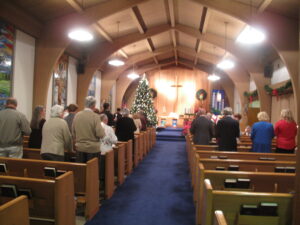The Lord be with you The Coronavirus has led most congregations in the United States to put a pause on their in-house worship services. Those of us who can have transferred our Sunday worship to the internet. While this approach has proven adequate for Christians who have access to the internet, for many there is a little nagging doubt in the back of their mind suggesting that such self-isolation from worship reflects badly on their faith. After all, can’t the Lord who heals the sick keep us safe or, barring that, heal us (Matthew 8:16: 15:30)?
The Coronavirus has led most congregations in the United States to put a pause on their in-house worship services. Those of us who can have transferred our Sunday worship to the internet. While this approach has proven adequate for Christians who have access to the internet, for many there is a little nagging doubt in the back of their mind suggesting that such self-isolation from worship reflects badly on their faith. After all, can’t the Lord who heals the sick keep us safe or, barring that, heal us (Matthew 8:16: 15:30)?
I am reminded of the account of the temptation of Jesus. During those temptations Satan urged Jesus to jump off the temple. (If you take a trip there the guides will even point to where they think this happened.) Matthew records:
 5 Then the devil took him to the holy city and set him on the pinnacle of the temple 6and said to him, “If you are the Son of God, throw yourself down, for it is written,
5 Then the devil took him to the holy city and set him on the pinnacle of the temple 6and said to him, “If you are the Son of God, throw yourself down, for it is written,
“‘He will command his angels concerning you,’
and
“‘On their hands they will bear you up,
lest you strike your foot against a stone.’”
7 Jesus said to him, “Again it is written, ‘You shall not put the Lord your God to the test.’” (Matthew 4:5-7)
Jesus responds to this temptation correctly, by checking the devil’s quote from the Scriptures against the other Scriptures in order to understand if the devil is accurate in his interpretation. First, the devil quotes Psalm 91, which reads:
11 For he will command his angels concerning you
to guard you in all your ways.
12 On their hands they will bear you up,
lest you strike your foot against a stone. (Psalm 91:11-12)
We see that Satan omits part of the verse, the phrase “in all your ways.” Whose “ways” is the Psalmist speaking of? Certainly not our ways, the way our hearts and minds direct us. Scripture reminds us:
The LORD saw that the wickedness of man was great in the earth, and that every intention of the thoughts of his heart was only evil continually. (Genesis 6:5)
and
9 The heart is deceitful above all things,
and desperately sick;
who can understand it? (Jeremiah 17:9)
So, instead of following our own sinful desires, the Lord urges us to follow his ways.
5 Trust in the LORD with all your heart,
and do not lean on your own understanding.
6 In all your ways acknowledge him,
and he will make straight your paths.
7 Be not wise in your own eyes;
fear the LORD, and turn away from evil. (Proverbs 3:5-7)
Because of our “Old Adam” there is always “a way that seems right to a man, but its end is the way to death” (Proverbs 14:12; 16:25). That is why we seek the way of the Lord and pray:
4 Make me to know your ways, O LORD;
teach me your paths.
5 Lead me in your truth and teach me,
for you are the God of my salvation;
for you I wait all the day long. (Psalm 25:4-5)
Or, put more succinctly by Jesus as he prayed in the Garden of Gethsemane, “Not my will but Thy will be done” (Matthew 26:39).
So the questions Jesus must ask himself are the same ones we must ask ourselves, “Has God commanded this action” or “Has God offered a promise concerning this action?” If God has done one of these things, then the path of action we are considering is “his ways.” Search as much as you want, you will not find a passage that says, ‘Jump off of any tall building (or any tall holy building or the top of the temple in Jerusalem) and God will keep you from going splat.’ Certainly you will find no command for Jesus, or us, to do such a foolhardy thing. So Jesus turns back to Scripture and finds Deuteronomy 6.
16 “You shall not put the LORD your God to the test, as you tested him at Massah. 17You shall diligently keep the commandments of the LORD your God, and his testimonies and his statutes, which he has commanded you. (Deuteronomy 6:16-17)
Without a direct command or promise from the Lord, stepping off the temple parapet would be testing the Lord, or, if you prefer the KJV, tempting the Lord. We do not get to decide which ways are the Lord’s ways. We find them as we “diligently keep the commandments of the LORD [our] God, and his testimonies and his statues”. We find this in the pages of the Bible.
When we are faced with an issue like self-quarantining because of the coronavirus, or any plague, epidemic, or pestilence, for that matter, the question we should never ask is, “Can God protect me?” The answer to most any “Can God do” question is, naturally, “Yes.” Can God make me fly? Yes. (Consider Elijah and the fiery chariot (2 Kings 2:11).) Can God make me walk through walls? Yes. (Consider Jesus appearing to his disciples behind locked doors (John 20:19).) (The only things God can’t do are things like not being God, or sin, and such silly things like that.)
Our questions should always be “Has God commanded this action?” or “Has God attached some kind of promise to this action?” During this time of pandemic, those questions would be something like, “Has God promised to put a bubble of protection around all who attend a Christian worship service, screening out viruses?” or, “Has God commanded me to attend Christian worship services even though I have a highly contagious disease?” The answer to such questions are “No.”
Examples of the Lord curing people are not commands or promises. They demonstrate what God can do, but not what he has promised to do. God can split the Red Sea and let people walk across on dry land (Exodus 14:21). He has not promised to do so for us when we visit the Red Sea. The Lord can raise the dead, as he did with Lazarus (John 11:43-44). He has not promised to do this for each one of us before the final resurrection of the dead on the Last Day? So, simply because Jesus can keep us safe from the coronavirus and, simply because he has healed people from various ailments in the past, is not a command or promise in ref erence to the current coronavirus pandemic.
erence to the current coronavirus pandemic.
In such situation, Jesus reminds us to not test/temp the Lord. We do what we feel is wise, but pass no judgment on others who may take a different course of action. We remember the words of Saint Paul who wrote, “So, whether you eat or drink, or whatever you do, do all to the glory of God” (1 Corinthians 10:31). As churches begin to resume in-house worship services, certainly some will begin earlier than others. Both groups are seeking to act in a way that brings God glory and conforms to his ways. For the individual Christian, their church may begin in-house worship services earlier than they are comfortable in attending. Maybe because they are in a high-risk category; maybe because they know they have been around someone with the coronavirus. Whatever the reason, no one who is in attendance should pass a harsh judgment against those who refrain from the in-house services and continues, for a time, to worship on-line. Not that the on-line option is a permanent solution. After all, we are told, “24And let us consider how to stir up one another to love and good works, 25not neglecting to meet together, as is the habit of some, but encouraging one another, and all the more as you see the Day drawing near” (Hebrews 10:24-25).
Blessings in Christ
Pastor John Rickert
